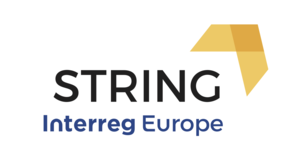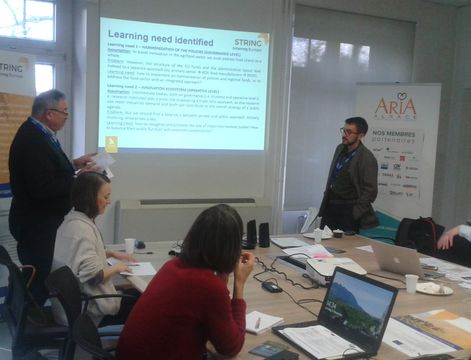We are daring to change world class solutions!
Creating the future of food policy across Europe requires courage to change our solutions - including those we know. This is the first major learning of our inter-regional cooperation in the food sector. You can not push in a rope. So easy is the answer to why some good solutions easily spread across both municipal and national borders, while others never go beyond the individual cluster organization.
How we spread and receive good solutions is a question we constantly encounter in our work to make Region Midtjylland - Denmark's Food Region - the world's best place to conduct food business. And for one year now, we have tested the validity of the European INTERREG Project STRING (Strategies for Regional Innovative Food Clusters). The easiest answer is that if we are to develop and share cross-border solutions, we and our partners must start pulling the rope. And it requires first and foremost that we dare to adjust and change our solutions. Also the solutions that already work.
Big differences in systems
With our 10 year old commitment in creating Denmark's Food Region our natural partners are international regions and organizations. We cooperate with other strong Dutch and French food regions. We do this to strengthen our international position and to make our region even better to run food business. We do this by developing cluster organizations and innovation environments that work.
Over time, we've learned that it's hard to copy or just inspire how others do. Organization, systems and political suspension are so different that it is difficult to identify what "the active substance" in a solution from Hungary, from Alsace or Spain.
An old American saying goes: "You can't push a rope". In our current reality, it means that we can not only push our solutions to the others and that others can’t just expect us to take all their solutions for good goods. We must create a pull in the rope. And it requires an openness that is often unfamiliar to honors organizations. But the fact is that we must constantly change our good solutions so that they can remain relevant. We need to move focus from Best Practice to Next Practice, like Bendix et. eel. already in 2008 found in their book "Public Innovation - From Best Practice to Next Practice"
It starts with a question
The approach to the assignment we have just tried in practice during a two-day visit to Spanish Castile and Leon, where the seven STRING regions were gathered. Here we searched for the "active substance" of the solutions we present to each other - initially, simply by asking and reflecting on a number of questions:
- Is the active substance specific activities we offer our companies?
- Is the active substance simple initiatives or programs that are particularly well-functioning?
- Is the active substance entire policy complexes and strategies that produce positive effects?
- Are there active substance principles, values, "culture" in the meeting with companies that are crucial?
- Is there a particular combination of the above?
Basically, we open up our systems so that others can copy what works - and that fits into their own system. As is written, it also gives reason to investigate whether our own world class solutions can be improved in collaboration with others. Just a little…
We work with simple tools that help visitors to clarify questions and reflect on their own system's ability to capture the presented solutions. We work with simple illustrations of our systems and we work structured with follow-up and generation of prototypes in local settings.
And it works! For example, we are currently considering in Central Denmark Region whether a Hungarian solution that integrates the political system closely with the business community can create value in our work. Dutch experience with new business models for high-quality food producers is also interesting. Soon we will visit our partners. We know they are hungry after seeing our solutions - to copy. But we also know that we have to invite inside the engine room. We must be courageous, let's provoke and dare to change our own world-class solutions.
Read more about STRING here: https://www.interregeurope.eu/string/
Facts
- STRING brings together 7 European regions, all of which have strengths in the food sector. The overall objective is to develop and improve local policies and tools / programs aimed at cluster development across value chains as well as research, development and innovation in the food sector.
- The result for each region is an action plan to improve regional policy instruments: new activities, tools and instruments aimed at strengthening clusters and improving cross-sector cooperation.
More information
Peter Astrup Development Consultant on the Food Industry in Central Denmark Region,
Tel: +45 2135 8784
Mail: [email protected]


